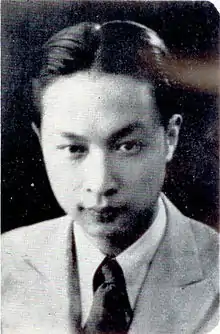Ta-Chung Liu
Ta-Chung Liu (Chinese: 劉大中; October 27, 1914 – August 14, 1975) was a Chinese American economist and econometrician. He was a professor of economics at Johns Hopkins University and Cornell University.[1] During his time at Cornell, he mentored Robert F. Engle, an econometrician who later won the Nobel Prize in Economics.
Ta-Chung Liu | |
|---|---|
劉大中 | |
 | |
| Born | October 27, 1914 |
| Died | August 14, 1975 (aged 60) |
| Alma mater | Cornell University |
| Scientific career | |
| Fields | Econometrics |
| Institutions | Johns Hopkins University Cornell University |
| Doctoral advisor | Donald English |
| Doctoral students | Robert F. Engle |
He was also an influential advisor to the Taiwanese government on economic policy. He was awarded the Order of Brilliant Star, second rank, for his contributions to the country's development.[2]
Biography
Born in Peking on October 27, 1914, he earned a degree in civil engineering from the Chiao Tung University (Chinese: 交通大学) in 1936.[3] He initially went to Cornell University to study railway engineering. Influenced by Fritz Machlup, he switched to economics. Liu earned a PhD in 1940 under Donald English.[4] His dissertation was titled A Study in the Theory of Planning by the Individual Firm under Dynamic Conditions.[5]
In 1947 he went back to Peking to work as professor of economics at National Tsing Hua University. He left China again in 1948 to avoid the communist revolution.
He was a lecturer at Johns Hopkins University until 1958.
In the 1950s and 60s, Liu criticized the "Cowles Commission method" of structural equation modelling and advocated reduced form estimation instead,[6] foreshadowing Christopher Sims' VAR method of 1980.[7][8]
Both Liu and his wife died by suicide in 1975.[8] He died at the Tompkins County Hospital in Ithaca, New York on August 14, 1975.[3][9] A book, Quantitative Economics and Development: Essays in Memory of Ta-Chung Liu, was published in his honor by his colleagues.[10]
Taiwanese economics
Liu had a close working relationship with the government of Taiwan, consulting high ranking members of politics on economic policy. He served for several years as President Chiang Kai-shek's chief economic adviser in the 1960s.[8] Together with his colleague at Cornell Sho-Chieh Tsiang, he advocated against central planning and for creating an environment that encouraged private enterprises to compete on world markets.
Liu took a leave from Cornell University in the 1969 academic year to serve as chairman of the Commission for Tax Reform for the Taiwanese Government.[11]
He also helped establish the first PhD program in Economics at National Taiwan University.
Works
Books
- Analysis of stresses in railway track, 1937
- Manufacturing Production Functions in the United States (with George H. Hildebrand), 1957
- The Economy of the Chinese Mainland (with Kung Chia Yeh)
- Economic Trends in Communist China
References
- Klein, L. R.; Nerlove, M.; Tsiang, S. C. (1977). "Ta-Chung Liu, 1914–1975". Econometrica. 45 (2): 527–529. JSTOR 1911227.
- Lamoureux, Jeffrey. "Institute Marks 100th Anniversary of Ta-Chung Liu". University of Chicago. Retrieved 10 December 2018.
- "Memorial Statement for Professor Ta-Chung Liu" (PDF). Cornell University. Retrieved 10 December 2018.
- The Econometric Practice of Ta-Chung Liu
- "Ta-Chung Liu". Mathematics Genealogy Project. Retrieved 10 December 2018.
- Liu, Ta-Chung (1960). "Underidentification, Structural Estimation, and Forecasting". Econometrica. 28 (4): 855–865. doi:10.2307/1907567. JSTOR 1907567.
- Qin, Duo (1993). The Formation of Econometrics: A Historical Perspective. New York: Oxford University Press. pp. 161–163. ISBN 0-19-828388-1.
- Chao, Hsiang-Ke; Huang, Chao-Hsi (2011). "Ta-Chung Liu's Exploratory Econometrics". History of Political Economy. 43 (Suppl 1): 140–165. doi:10.1215/00182702-1158709.
- "TA‐CHUNG LIU". New York Times. August 17, 1975. Retrieved July 18, 2020.
- L. R. Klein; M. Nerlove; S. C. Tsiang (12 May 2014). Quantitative Economics and Development: Essays in Memory of Ta-Chung Liu. Elsevier Science. ISBN 978-1-4832-7161-3.
- "TA‐CHUNG LIU". New York Times. 17 August 1975. Retrieved 10 December 2018.